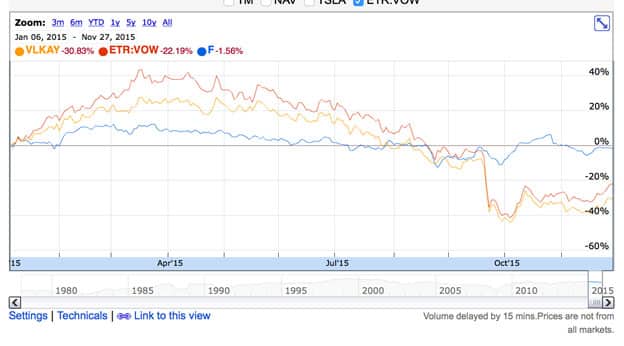CEOs and Trust: Why Collaboration Wins Out Over Command And Control

“Can’t we all just work together?” When former Ford CEO Alan Mulally asked a group of executives this question, Mark Fields was paying attention—and it’s a question that makes all the difference now Fields is CEO of Ford.
Let’s examine the roads Ford and Volkswagen have traveled this year. This September, Martin Winterkorn resigned as the CEO of Volkswagen in the wake of the revelation that the company had equipped 11 million diesel cars with software designed to fool emissions tests. Winterkorn claimed he had no knowledge that the cheating software even existed.
If Winterkorn truly knew nothing about this software, why was he forced to resign?
A culture of “command and control”
Volkswagen’s leadership is organized around the “command and control” management style. Though outdated, this style, based on military management, remains by far the most common leadership model in use today. Orders flow from the top down through a chain of command.
The idea is that absolute responsibility builds absolute trust. Ironically, though, this model often achieves exactly the opposite of its intended effect.
Once orders are executed, the only measure of value is performance. There’s no space for whys or hows. Thus, when mistakes are made or corners cut, as at VW, trust that was blind is lost. In the resulting atmosphere of suspicion, heads roll—including the CEO’s.
A question of trust
In light of crises like these, it’s no surprise that leaders around the world are reevaluating the traditional model of leadership.
A recent survey of CEOs found that trust is becoming a high priority for a growing number of corporate leaders. A full 50 percent of executives cite “lack of trust in business” as a major concern—and many are pursuing “good growth” that benefits their customers and communities, with customer and employee feedback helping to drive company policy.
An example is Mark Fields. Although Ford was involved in five of the top ten auto-related recalls over the past year—more than any other automaker—no one called for Fields to step down. Why? Because he’s brought a “cohesive and collaborative” leadership culture to Ford.
In a recent Forbes interview, Fields explained how he trusts in the strengths of others in the organization, and offers them support when they struggle. “I’ve gotten better at involving everybody, and learning to ask the right questions,” he said, “never with the intent of thinking [I] have all the answers.”
In other words, at Ford, communication runs both ways. Fields’ receptive attitude has built trust throughout Ford, which enables Fields to learn about and help correct problems long before they turn into scandals. This not only empowers better leadership—it also results in a stronger and more adaptable organization.
The power of collaboration
In an organization of any size, no one person can know every issue the company is facing—but a collaborative CEO can ask good questions. When information flows both ways, trust and collaboration ensure problems are surfaced, solutions are sought flexibly, and in an environment where everyone benefits, the company ultimately grows stronger.
One wonders how much strife could be avoided if Winterkorn, and other CEOs like him, were to show an inclination to listen. As VW and companies like it look ahead, they would do well to consider abandoning the command and control model of leadership and embody the principle of collaboration.
If we’ve learned anything over the last year, it’s this: collaboration is vital not only for a CEO’s survival, but perhaps for a company’s as well.
* * *
FYI: Year to date, Ford is down 1.58%, while VW is down 22.19% in Europe (VOW; the common stock itself) and, better comparable, 30.83% in the US (VLKAY; the American Depository Receipt equivalent to 1/5th of a VOW share.) Graph below.
*****
Rugger Burke is the author of “The Power of 10: A Practice of Engaging Your Voice of Wisdom” releasing Oct. 6, 2015 by Mill City Press. Burke lives in Dallas where he works for a private investment firm. Along with pursuing his life’s goal of learning to play a Halo handpan, he is an avid traveler, having visited six continents and motorcycled across four – still searching for the best chocolate chip cookie. He shares his home with a border collie, Peaches aka Superdog. For more information, visit ThePowerOf10.com.
Bring the best of the CEOWORLD magazine's global journalism to audiences in the United States and around the world. - Add CEOWORLD magazine to your Google News feed.
Follow CEOWORLD magazine headlines on: Google News, LinkedIn, Twitter, and Facebook.
Copyright 2025 The CEOWORLD magazine. All rights reserved. This material (and any extract from it) must not be copied, redistributed or placed on any website, without CEOWORLD magazine' prior written consent. For media queries, please contact: info@ceoworld.biz









